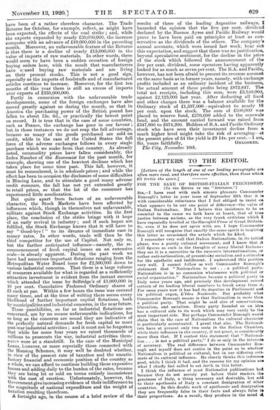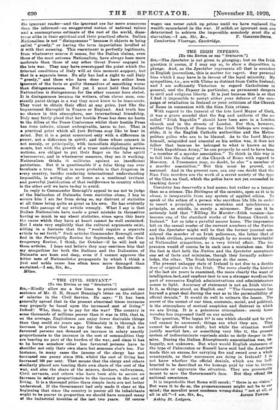LETTERS TO THE EDITOR.
[Letters of the length of one of our leading paragraphs are often more read, and therefore more effective, than those whicle fill treble the space.] FOR THE SAKE OF BRITISH-ITALIAN FRIENDSHIP. (To THE EDITOR OP THE "SPECTATOR."] have read with such sincere pleasure Commander Roncagli's letter in your issue of September 25th that it is with considerable reluctance that I feel obliged to insist on what appears to be our one point of difference—the value of Italian Nationalism. But I believe this insistence to be as essential to the cause we both have at heart, that of true
justice between nations, as the very frank criticism which I have repeatedly levelled at the Slavophil Press of Great Britain. So, even if he does not agree with me, I hope Commander Roncagli will recognize that exactly the same spirit is inspiring this letter as occasioned the article which he liked.
I remember very well that Italian Nationalism, in its initial
phase, was a purely cultural movement, and I know that it still figures as such in the thoughts of many liberal Italians: they see it is a corrective to the excessive internationalism, or rather anti-nationalism, of present-day socialism and a stimulus for the aPathetie and indifferent. I understand this position very well. I cannot follow so well Commander Roncagles statement that "Nationalism is not . . . a political party. Nationalism is in no connexion whatsoever with political or social organization." Nationalism became a political party in Italy some years ago, and precisely this development caused certain of its leading liberal members to. break away from it. For some years now it has had its deputies in Parliament and its political organ, L'Idea Nasionale. But probably what Commander Roncagli means is that Nationalism is more than a political party. That might be said also of conservatism, liberalism, and socialism. Every party founded on an ides has a cultural side to its work which may very easily be the most important side. But perhaps Commander Roncagli would claim that in the case of Nationalism the cultural character is particularly accentuated. I grant that also. The National- ists have at present only two seats in the Italian Chamber, while their influence in the country, if not great, is considerably more than that. If I contest this statement that "National- ism . . . is not a political party," I do so only in the interests of accuracy. The real difference between Commander Ron- cagli and myself does not centre in the point as to whether Nationalism is political or cultural, but in our differing esti- mate of its cultural influence. He clearly thinks this influence good, while I think it bad, and the reasons for my opinion are what I chiefly feel called to set forth in this letter.
I think the influence of most Nationalist publications bad
because they do not merely put before their readers the greatness- of Italy, a thing necessary and desirable, but add to their apotheosis of Italy a constant denigration of other countries. In this double work of apotheosis and denigration they are frequently false in their facts and always false in their proportions. As a result, they produce in the mind 4 Ike ignorant reader—and the ignorant are far more numerous -than the informed—an exaggerated -notion of national "alum and a contemptuous -estimate of the rest of the worlds dims- :trims alike in theirsipiritualnud their practical effecte. Italian Nationalism is not " diaingenuous " because it objects to being called "greedy." or Juiving the term imperialism levelled at it with that meaning. 'This resentment is perfectly legitimate, from whatsoever source it comes, for the Italian claims, even those of the most extreme Nationalists, -have always been more moderate than those of any ether Great Power engaged in the late war. They may have overstepped the point which 'the Internal conditions of Italy will ..at this annment support, but that is a separate issue. No ally has had -a right to call Italy 4' greedy," and those who have done so have either been ignorant of the facts or .guilty themselves of something worse than disingenuousness. But yet I must .hold that Italian Nationalism is disingenuous for the other reasons here stated. It is disingenuous because its writers, often clever men, con- stantly paint things in a way they must know to be inaccurate. They want to obtain their effect at any price, just like the Impassioned Slavophil In 'France or England. And truth has no chance in this atmosphere, -nor international friendship. Italy may fairly -plead that her hostile Press has done no harm to the Allies at the Peace Conference whilst their hostile Press has done infinite, almost unforgivable, harm to her. That is a practical point which all jest Britons may like to bear in mind. But it is a point concerned only with a difference in power, not a difference in spirit; and those whose concern is not merely, or principally, with immediate diplomatic settle- ments, but with the growth of a truer understanding between nations, are obliged to put their finger on the false spirit wheresoever, and in whatsoever measure, they see it working. Nationalism thinks it militates against an insufficient patriotism. But it is questionable -if a false thing can ever Inculcate a true. What is more probable is that Jingoism in every country, besides rendering international understanding Impossible, is acting also at home as a continual -irritant and powerful justification of that indifference to country whieh Is the other evil we have to-day to avoid.
In reply to -Commander Roncagli's appeal to me not to judge of the Italianism of Dalmatia from statistics alone, I beg to assure him I am far from doing so, my distrust .of statistics at all times being quite as great as his own. He has evidently read this passage of my article wrongly. What I say is that Italian Nationalists have made a great mistake in themselves having so much to say about ,statistics, since upon this basis the cause which they have at heart cannot he -well sustained. But I state very explicitly that the cultural arguments exist, lidding in a footnote that they "would require a separate article to set forth." Such articles Commander Roncagli could find in the Fortnightly Review for September, and the Con- temporary Review, I think, for October—if he will look up these articles. I hope and believe they may convulse him that say sympathies for both the Italians and the Italianism of Dalmatia are keen and deep, even if I cannot -approve the bitter note of NationalisLc propaganda by which I think a lust and noble cause has often been more damaged than







































 Previous page
Previous page